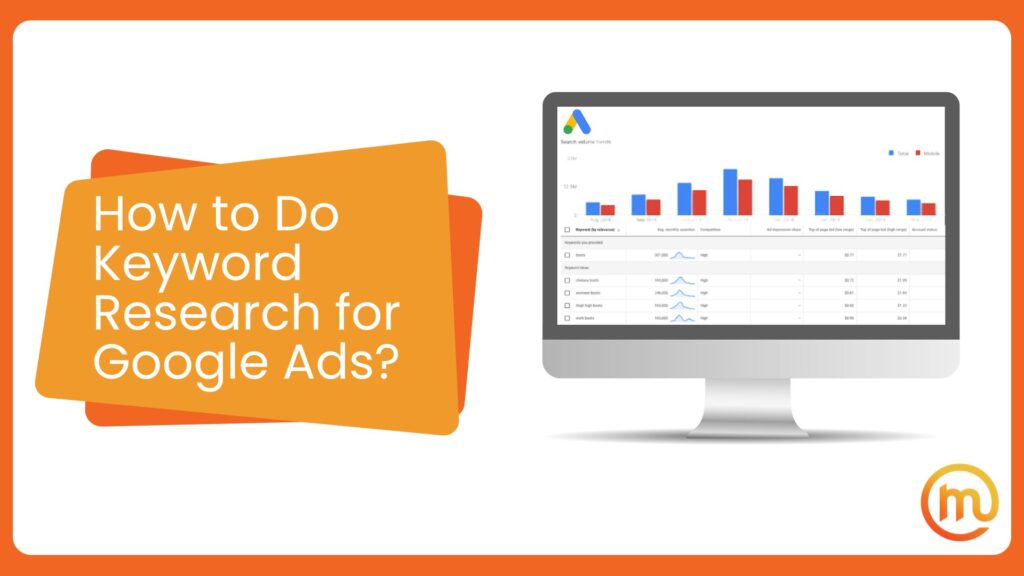The right keywords can make a world of difference. Here, research is vital, and it always comes down to the goals of your campaign. If you’re wondering how to do keyword research for Google Ads to boost your online marketing efforts, here’s everything you need to know and more.
Using Google Keyword Planner is the best way to do your research for this platform. You can start with one basic phrase and generate plenty of other ideas. Also, you can simply enter the URL of your website and let this tool work its magic. In addition, it will provide you with plenty of valuable insights, from average monthly searches to estimated costs for each entry.
Why Is Keyword Research Important for Google Ads?
Forget about the social media detox – ever tried surviving a day without Googling something? It sounds impossible, right? Well, half of the globe is right there with you. Each day, more than 8 billion searches are made on Google, accounting for almost 92% of the global search engine market.
Trying to find the best pizza place in town? Need to refresh your memory for a recipe? Can’t remember the name of that actor but you’ve definitely seen him before? Everything is a quick search away with this all-knowing digital behemoth. But if it’s such an intrinsic part of our daily lives, shouldn’t keyword research come naturally? Do you really need to use special tools for it?
The Right Keywords Will Help Your Ads Reach the Right People
As an auction-style pay-per-click (PPC) advertising platform, Google Ads is an important consideration for any small business owner. The budget will go towards clicks on your ad only, and it will be displayed across Google’s seemingly boundless network, including search engine results pages (SERPs), partner websites, and various apps.
However, without the right keywords, you won’t be able to make the best out of this vast digital landscape. Your ad will start to struggle to reach your target audience, and getting people to your website will seem almost impossible. Appropriate keywords will improve both audience and message match, not only reaching the right people but also engaging them further. The return on investment (ROI) of your digital marketing campaign will have a better chance to take a turn for the better.

What Is Google Keyword Planner?
Google Keyword Planner is a free-of-charge research tool on the Google Ads platform. Specifically designed to find keywords with a good amount of search volume, it’s invaluable to your digital marketing campaign.
Google Trends is another helpful tool here, providing you with real-time insights into the popularity of a certain term over time. However, when it comes to discovering new ones you should use, Keyword Planner should be your baseline.
What Are the Benefits of Using Google Ads Keywords Research Tool?
As someone who’s dedicated to growing your small business, you could probably write a whole book (or two) about the products or services you offer. But when the Google algorithm is your co-author, you need to figure out how to work together to create something that truly counts. This partnership can be difficult to navigate at times, especially with the algorithm being updated more than 500 times a year.

How to Do Keyword Research for Google Ads
Having such in-depth knowledge about your product or service, you probably feel like choosing the right keywords is super straightforward and intuitive. However, you might just find yourself surprised at some terms that pop up as promising avenues for your campaign. After all, half of the search queries consist of four or more words – brainstorming all possible combinations will surely take a lifetime.
For the most effective strategy, you could use some help – and what’s better than going straight to the source? To get started, all you need to do is sign into your Google Ads account, select “Tools and Settings” on the top, and find the “Keyword Planner”. Hint – it’s under the “Planning” column. When you choose the option “Discover New Keywords”, you’ll see that the platform offers two ways to go about it. So, let’s take it one method at a time.
Method 1 – Starting With Your Own Keywords
For the first method, you’ll need some dough to create the bread. Put yourself in the shoes of your potential customers and think about what kind of phrases you would be googling to find the service or product you’re offering. Jot down 5 to 10 ideas and paste them into the research tool, splitting them into separate rows or with commas.
You can also enter the URL of your website to help the platform remove any services and products you’re not offering. Don’t forget to select the locations you’re targeting as well. Once you click on “Get Results”, you’ll be greeted with numerous related keywords, in some cases thousands of them. While the process itself is simple, the metrics that will appear alongside are far from it – but more on that later.
Method 2 – Starting With Your Website
The second method is equally as straightforward. You enter the URL of your business’s website or of a specific page that contains the services or products you need ideas for, and voilà – there are keywords for days. Just keep in mind that hyperlinks won’t be used to generate these new ideas.

You Can Use Google Keyword Planner to See Specific Metrics Too
No matter the method you’re using, you’ll be able to edit the list you get. You can filter out and refine the keywords by category, unchecking what you don’t need for your campaign. For example, if you only want to see keywords related to “white running shoes”, you have the option to get rid of all other colors.
However, figuring out the exact keywords you should add to your advertisements requires a much deeper understanding of the trend graphs and data that are right beside each one. Here’s what you’ll be looking at:
- Average monthly searches – how many people are actually searching for this particular phrase each month,
- Three-month change and year-over-year change – useful trends to help you figure out where things are headed,
- Competition – how difficult it will be to get ad space for a particular search query, with medium and low offering the most promising avenues,
- Ad impression share – shown only for keywords you’re already using for your campaigns, expressing the share of the total impressions you’re capturing,
- Top of page bid (low and high range) – an estimate of how expensive it will be per click.
Besides the “Discover New Keywords”, there’s also the “Get Search Volume and Forecasts” option. This will provide you with more or less the same information, the only difference being that Google will also predict how many clicks and impressions each entry will get. These forecasts are refreshed daily and adjusted for seasonality based on the last 7 to 10 days. During this time frame, they’ll also take into account the ever-changing market trends.

How Specific Do My Keywords Need to Be?
Before you start adding keywords to your ad sets, let’s go over one crucial thing – how specific should you be to get on the good side of Google’s algorithm? With which queries should potential customers be able to reach your advertisement? Well, there are three distinct keyword match types you can choose from:
- Broad match – allows your ads to show on search queries related to a specific keyword, even if they don’t match the exact meaning, for example, if the keyword is “shoes”, it can appear in searches such as “footwear” or “sneakers”,
- Phrase match – as long as your chosen phrase is there, the advert can appear even when there are other words before or after it, for example, if the keyword is “running shoes”, it can pop up for queries such as “best running shoes” or “running shoes for trail”,
- Exact match – appears only when a person searches for the exact phrase or something that’s a really close variant, including misspellings and abbreviations, in our example, “running shoes” will appear only for that specific query or very similar searches like “run shoes”.
Adding Your Keywords To Existing Campaigns
After you’ve got your list, there are two ways to include these entries in your campaigns. You can save them to your plan and organize them later, or you can add them to existing campaigns. This is done at an ad group level – once you select the one you want, the option for “Search Keywords” will appear on the left.
Simply write the keyword you want to incorporate and click “Save”. To add them with the desired match type, let’s use our previous example:
- Running shoes (with no additional symbols) for broad matches,
- “Running shoes” for phrase matches,
- [Running shoes] for exact matches.

Keyword Planner Can Also Be Handy for SEO
While this tool is a part of a pay-per-click advertising platform, that doesn’t mean you can’t use it for other purposes. This includes search engine optimization (SEO), a powerful and completely organic way to boost the online presence of your business. Unlike PPC, it can provide long-lasting results for your business. Here are just a couple of ways you can use the Planner for your SEO strategy:
- Finding low-competition keywords that align with your content strategy,
- Discovering trending topics with the help of three-month change and year-over-year change metrics,
- Exploring what the competitors in your industry are targeting and refining your own strategy accordingly.
Not Sure Where To Start? An Experienced Content Marketing Agency Can Help
Competing for online visibility can get pretty intimidating for any small business out there. So many different strategies need to be added to the whole equation, from making the most of your PPC campaign on Google Ads to implementing SEO strategies for organic growth.
Instead of getting lost in the maze of search engines and algorithms, you should be focusing on your line of work – so why not leave the rest to the pros? Contact us at Made Online to find out how we can help. Stay true to why you started your business in the first place, while our professional SEO marketing agency handles the rest – we’re in this together.

